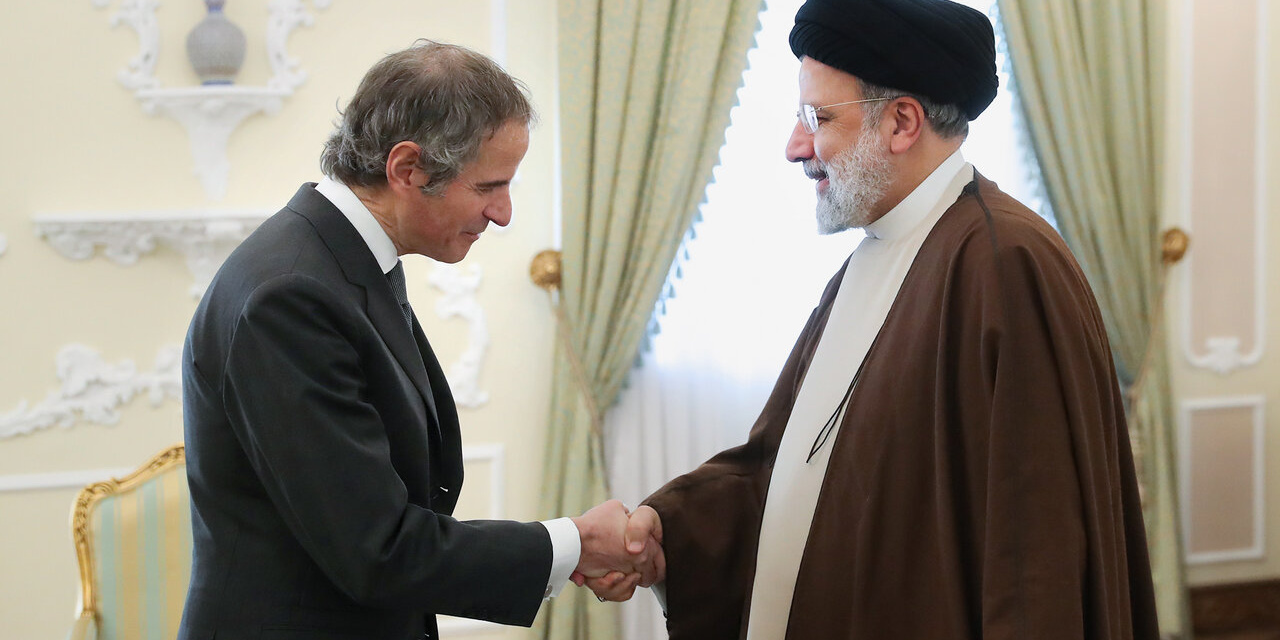Iran President Ebrahim Raisi receives International Atomic Energy Agency head Rafael Grossi, March 4, 2023
The head of the International Atomic Energy Agency, Rafael Grossi, has criticized Iran’s “disproportionate and unprecedented” barring of nuclear inspectors.
Iran blocked the inspectors in response to a call — led by the US, the UK, France and supported by 62 IAEA member-states — for this week’s IAEA Board of Governors to insist on cooperation from Tehran over its nuclear activities.
I strongly condemn this disproportionate and unprecedented unilateral measure which affects the normal planning and conduct of agency verification activities in Iran and openly contradicts the cooperation that should exist between the agency and Iran.
Under the Nuclear Non-Proliferation Treaty, a country can “de-designate” a specific inspector assigned to visit its facilities.
But the IAEA noted that Tehran imposed a blanket ban on “several” inspectors.
These inspectors are among the most experienced agency experts with unique knowledge in enrichment technology. With today’s decision, Iran has effectively removed about one third of the core group of the Agency’s most experienced inspectors designated for Iran….
This measure, while formally permitted by the NPT Safeguards Agreement, has been exercised by Iran in a manner that affects in a direct and severe way the ability of the IAEA to conduct effectively its inspections in Iran.
Iran Foreign Ministry spokesperson Nasser Kan’ani said, “Unfortunately, despite Iran’s positive, constructive, and continuous interaction with the agency, the three European countries and the United States abused the Board of Governors for their own political purposes.”
He insisted, “Of course, Iran will continue its positive cooperation within the framework of the agreements that have been made.”
But Grossi was not convinced: “I call upon the Iranian Government to reconsider its decision and to return to a path of cooperation with the Agency.”
Another Blow to a Renewed Nuclear Deal?
Talks to renew the 2015 nuclear deal between Iran and the 5+1 Powers (US, France, Germany, UK, China, and Russia) have been stalled since early 2022. The discussions were seeking an American return to the agreement, follwing the Trump Administration’s withdrawal in May 2018; Iran’s return to limits on uranium enrichment; and a lifting of US sanctions.
Iran is limited to production of 3.67% uranium under the deal. However, it has not only resumed its pre-2015 production of 20% uranium, but begun production of 60% fuel. That potentially could be further enriched to the 90% grade needed for nuclear warheads.
Tehran has withheld video footage of its nuclear facilities since 2021, and removed cameras from several sites in June 2022.
Earlier this month, Iran’s Foreign Ministry talked up the prospect of a new agreement, as a deal was struck for the release of five American political prisoners in return for the unfreezing of $6 billion in Iranian assets held in South Korea.
See also UPDATES: Iran to Release 5 US-Iranian Political Prisoners
But other factions in Iran’s regime, including the Revolutionary Guards and the Supreme Leader’s office, did not join the optimistic statements.
Two weeks ago, the IAEA said in confidential reports seen by AFP that Iran had made “no progress” on several key issues, including the installation of more cameras to monitor the nuclear program.
Grossi asked Iran “to work with the agency in earnest and in a sustained way towards the fulfillment of the commitments”.
Tehran’s total enriched uranium stockpile was estimated at 3,795.5 kg (8,367.7 pounds) as of August 19, down by 949 kilograms from May but almost 18 times higher than the limit in the 2015 deal of 202.8 kg.
The stockpile of 60% uranium was 121.6 kg, up from 114.1 kg in May.


Leaked audio tape reveals Biden officla (McGurk) stating that the US has no plans to go back into the JCPOA and wants to do, which is apply sanctions, isolation, threats of war and sabotage: https://www.tehrantimes.com/news/489117/The-Real-Plan